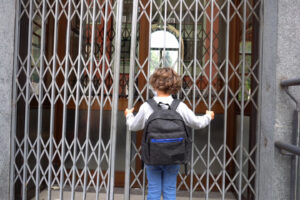This family doctor, NYT best-selling author argues left-leaning parents lack ‘structure’ and ‘boundaries’ for their children
Many politically left-leaning parents have difficulty providing consistent discipline and structure for their children, a family physician and psychologist wrote in a popular essay.
In fact, the…

Many politically left-leaning parents have difficulty providing consistent discipline and structure for their children, a family physician and psychologist wrote in a popular essay.
In fact, the Institute for Family Studies (IFS) reports the essay was its top website post of last year, which also urged parents to adopt a parenting style that is both “strict and loving.”
“Our number 1 blog post of 2023 with over 39,000 page views is this April 2023 essay on politics and parenting from Dr. Leonard Sax,” reads the IFS editor’s note that introduces the top piece, titled “Do Your Political Beliefs Affect Your Parenting?”
Sax opened his essay with a story about an experience he had in his office with a mother who brought her six-year-old daughter in with a fever and sore throat:
I asked the little girl to open her mouth and say “Ah.” She shook her head and clenched her mouth shut. “Mom, it looks like I’m going to need your help here,” I said. “Could you please ask your daughter to open her mouth and say ‘Ah’?” Mom arched her eyebrows and replied, “Her body, her choice.”
“Wow,” Sax remarked. “This mom was invoking the ‘My body, my choice’ slogan of abortion-rights activists to defend her 6-year-old daughter’s refusal to let me, the doctor, look at her daughter’s throat.”
The physician said he had never made any connection between parenting and politics during most of the 34 years of his practice. Eight years ago, however, he was inspired to write his book, The Collapse of Parenting: How We Hurt Our Kids When We Treat Them Like Grown-Ups, which ultimately became a New York Times bestseller.
“I wrote the book because I had noticed that more and more parents were becoming too permissive,” Sax wrote. “As I showed in the book, that trend toward permissiveness wasn’t confined to families in my practice: scholars now find that the culture of the United States is increasingly a culture in which ‘children rule.’”
Sax explained that, since he wrote his book, he’s grown increasingly aware of “a political dimension to parenting.”
“It is now much less common to find left-of-center parents who are both strict and loving,” he said. “Loving, yes, but not strict. I’m seeing a growing number of parents like the mom I just described – parents who truly believe that it’s virtuous to let the kid be in charge, even when the kid is a six 6-year-old with a fever who is refusing to let the doctor look at her throat.”
A recent article in Parents magazine, Sax cited, promotes the concept of “gentle parenting,” describing it as “patient, calm, and punishment-free,” an “evidence-based approach that focuses on empathy, respect, understanding, and boundaries.”
But “[t]he gentle parent lets the child decide,” the physician and psychologist warned. “The gentle parent never uses punishments of any kind, not even time-outs. The gentle parent does not toilet train the child, but instead ‘models’ toileting for the toddler, which will (it is hoped) inspire the toddler to want to use the toilet instead of the diaper.”
Sax pointed to a March 2022 piece at left-leaning The New Yorker that referred to “The Harsh Realm of ‘Gentle Parenting,’” calling it a parenting approach that has grown popular “because it caters to a child’s inner life.”
“What does it neglect?” asked author Jessica Winter, who observed the child-rearing mode “has been the vogue among vigilant, trend-aware P.M.C. [the professional-managerial class] parents for some time.”
Winter, Sax quoted, explained that “gentle parenting requires the parent to transform himself/herself into a ‘a self-renouncing, perpetually present humanoid who has nothing but time and who is programmed for nothing but calm.’”
She predicted, he continued, “that the next generation can ‘anticipate blaming their high rates of depression and anxiety on the over validation and under correction native to gentle parenting.’”
After a decade of watching this phenomenon of parenting style and political persuasion, Sax says he daily notices “the parents who are practicing gentle parenting are (in my experience) almost always politically left-of-center.”
“This is a big change,” he emphasized. “As recently as 10 years ago, it wasn’t unusual to find left-of-center parents who were authoritative, even strict. That is less common today.”
As reported by The Lion in December, a research brief released in November by IFS and Gallup affirmed “parents who provide caring and sound discipline in their parenting style produce the most promising mental health outcomes for their children.”
The best outcome for children comes from “warm, responsive, and rule-bound, disciplined parenting,” wrote the brief’s author Jonathan Rothwell, principal economist at Gallup and a nonresident senior fellow at The Brookings Institution.
Sax summarized his observations:
In my experience, permissive parenting is now more common among left-of-center parents than among right-of-center parents. That’s important, because researchers have found that permissive parenting leads to young adults with “less sense of meaning and purpose in life, less autonomy and mastery of the world around them.”
Sax noted that when he now suggests to permissive parents that loving, but authoritative, parenting is essential to a child’s development, “left-of-center parents are more likely to push back.”
“They tell me that they don’t want to be ‘controlling’ or ‘coercive.’ A decade ago, I could have persuaded such parents that kids need structure, rules, and consistency. Today, I don’t have much luck with permissive left-of-center parents: ‘Her body, her choice.’”



